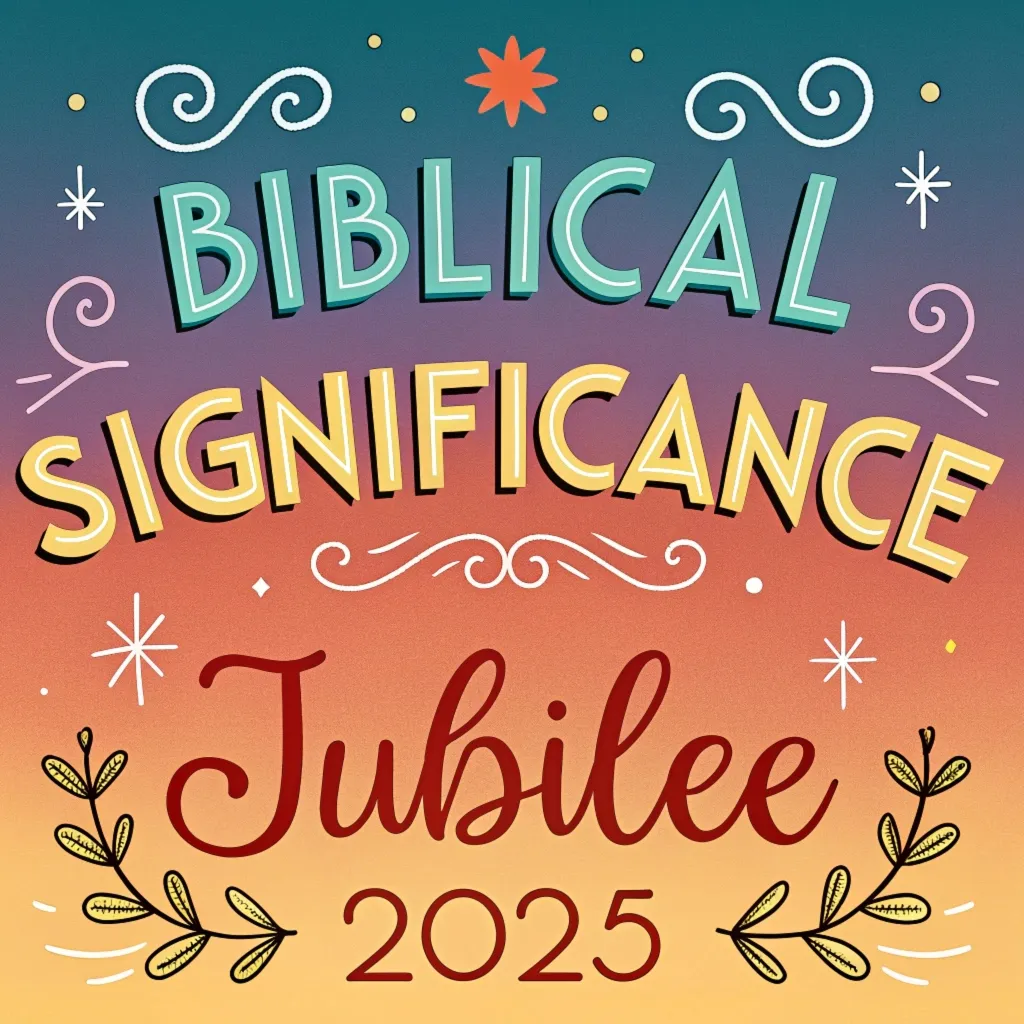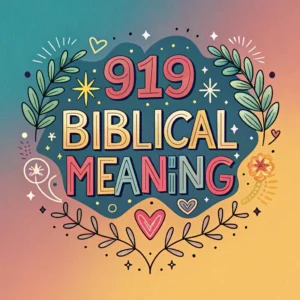The Bible tells us about a special time called Jubilee. It was like a big party that happened every 50 years. During Jubilee, amazing things happened.
People who owed money didn’t have to pay it back. Slaves were set free. Families got back land they had lost. It was a time when everyone got a fresh start.
God wanted Jubilee to help people be kind and fair to each other. He wanted to make sure no one stayed poor forever. Jubilee was a happy time that showed how much God cares about everyone. It taught people to share and help others.
In this post, we’ll learn all about Jubilee. We’ll see why it was so important in the Bible and what it can teach us today.
Get ready to discover how this special year changed lives and made the world a better place!
The Essence of Biblical Jubilee

- Divine Reset: Jubilee occurred every 50 years, serving as a God-ordained reset for society.
- Land Restoration: All land returned to its original owners, preventing long-term inequality.
- Debt Forgiveness: All debts were canceled, offering a fresh start to those in financial distress.
- Freedom for Slaves: Hebrew slaves were set free, emphasizing human dignity and equality.
- Agricultural Rest: The land was left fallow, promoting environmental stewardship.
- Social Equality: Jubilee aimed to prevent the formation of permanent underclasses.
- Spiritual Significance: It symbolized God’s grace and the restoration of right relationships.
- Prophetic Fulfillment: Jesus claimed to fulfill the spirit of Jubilee in His ministry.
- Economic Justice: The practice challenged the accumulation of wealth and power.
- Community Focus: Jubilee strengthened family and tribal bonds through property reversion.
- Divine Provision: Trust in God’s provision was central to observing the Jubilee year.
- Sabbath Principle: Jubilee extended the Sabbath concept to a grand scale.
- Messianic Hope: The year pointed to future restoration and redemption.
- Practical Challenges: Historical evidence suggests rare full implementation of Jubilee.
- Modern Relevance: Jubilee principles continue to inspire social and economic reforms.
The Origin and Timing of Jubilee
The biblical Jubilee finds its roots in the book of Leviticus, specifically chapter 25. God instructed Moses to establish this special year as part of the covenant with Israel. The timing of Jubilee was precise and significant:
- It occurred every 50th year
- The cycle began after seven sets of seven years (49 years)
- The Jubilee year was announced on the Day of Atonement
- A ram’s horn (yobel in Hebrew) was sounded to proclaim its beginning
This divine timetable ensured that each generation would experience at least one Jubilee, making it a once-in-a-lifetime event for most Israelites.
God made a plan for a special year called Jubilee. He told Moses about it a long time ago. Jubilee happened every 50 years. That means if you were born right after one Jubilee, you might see the next one when you’re old.
People would count seven times seven years, which is 49 years. Then, the next year was Jubilee. They used a special horn called a ram’s horn to tell everyone Jubilee was starting. It was a very exciting time for all the people.
The Three Pillars of Jubilee
The Jubilee year rested on three fundamental principles that reshaped society:
1. Land Restoration
All land sold during the previous 49 years reverted to its original owners. This practice:
- Prevented the formation of large estates
- Ensured each family retained its ancestral inheritance
- Recognized that the land ultimately belonged to God
2. Debt Forgiveness
All debts were canceled during the Jubilee year. This radical act:
- Offered a fresh start to those in financial distress
- Prevented generational poverty
- Reflected God’s grace and forgiveness
3. Liberation of Slaves
Hebrew slaves were to be set free during Jubilee. This liberation:
- Affirmed the dignity of all Israelites
- Reminded the people of their own deliverance from Egypt
- Emphasized that all Israelites were servants of God alone
Jubilee had three main parts that made it special. First, land went back to the families who first owned it. This helped make sure no one got too rich or too poor. Second, if someone owed money, they didn’t have to pay it back.
This gave people who were having a hard time a chance to start over. Third, slaves were set free. This showed that everyone was important and equal. These three things helped make life fair for everyone.

The Spiritual Significance of Jubilee
Beyond its socio-economic impact, Jubilee held deep spiritual meaning:
- It symbolized God’s grace and restoration
- The year taught trust in divine provision
- Jubilee pointed to the future messianic age
- It reminded Israel of their covenant relationship with God
Jubilee was more than just about money and land. It had a special meaning about God. It showed how God forgives people and helps them start over. The Jubilee year taught people to trust that God would take care of them.
It also made people think about a future time when everything would be perfect. Jubilee reminded the Israelites that they had a special promise with God.
This promise was called a covenant. The Jubilee year helped people remember this important promise.
Jesus and the Fulfillment of Jubilee
In Luke 4:16-21, Jesus proclaimed His ministry as a fulfillment of Isaiah’s prophecy, which echoed Jubilee themes:
- He announced “the year of the Lord’s favor”
- Jesus claimed to bring liberation to captives
- His ministry offered sight to the blind and freedom to the oppressed
This declaration positioned Jesus as the ultimate embodiment of Jubilee principles.
Jesus talked about Jubilee too. He said He came to make the good things of Jubilee happen for everyone. Jesus said He would help people who were stuck or sad.
He would make blind people see and set people free who were trapped. Jesus was saying that He was like a big Jubilee for the whole world. He wanted to give everyone a fresh start and show them God’s love.
The Challenges of Implementing Jubilee
While the Jubilee law was clear, historical evidence suggests it was rarely fully observed:
- The practice required immense faith in God’s provision
- It challenged human tendencies towards wealth accumulation
- Political and economic pressures may have hindered implementation
Despite these challenges, the ideal of Jubilee remained a powerful force in Israel’s spiritual and social consciousness.
Even though Jubilee was a good idea, it was hard for people to do it. They had to trust God a lot to give up their money and land. People often want to keep things for themselves, so it was hard to share.
Sometimes, leaders didn’t want to follow the Jubilee rules because it meant they would lose power.
But even if people didn’t always do Jubilee, they still thought it was important. The idea of Jubilee helped people remember to be fair and kind to each other.
Jubilee’s Impact on Land and Agriculture
The Jubilee year had significant implications for land use and agriculture:
- The land was to lie fallow for the entire year
- People were to eat from the previous year’s produce
- This practice promoted soil conservation
- It taught reliance on God’s provision rather than human effort
Jubilee changed how people used the land. For a whole year, they didn’t plant any crops. This gave the soil a rest. People ate food they had saved from the year before. This way of farming helped keep the soil healthy.
It also taught people to trust that God would give them what they needed. They learned that they didn’t have to work all the time to have enough food.

Social and Economic Justice in Jubilee
Jubilee served as a mechanism for social equity:
- It prevented the permanent alienation of ancestral lands
- The practice limited economic disparities within the community
- Jubilee fostered a sense of shared responsibility among Israelites
Jubilee helped make things fair for everyone. It made sure that families didn’t lose their land forever. This stopped some people from getting too rich while others stayed poor.
Jubilee taught people to care about each other and help those who were having a hard time. It made everyone feel like they were part of one big family and should take care of each other.
The Prophetic Vision of Jubilee
Old Testament prophets often invoked Jubilee imagery:
- Isaiah used Jubilee language to describe future restoration
- The concept informed visions of the messianic age
- Prophets critiqued society for failing to embody Jubilee principles
The prophets in the Bible talked about Jubilee too. They used the idea of Jubilee to talk about a time when everything would be made right. They said that one day, God would make the whole world like a big Jubilee.
The prophets also told people they should be living more like it was Jubilee all the time. They wanted people to be fair and kind to each other every day, not just every 50 years.
Jubilee in the New Testament Context
While not explicitly mentioned, Jubilee themes resonate in the New Testament:
- Jesus’ teachings on forgiveness echo Jubilee principles
- The early church’s sharing of possessions reflected Jubilee ideals
- Paul’s writings on freedom in Christ parallel Jubilee liberation
The New Testament doesn’t talk about Jubilee by name, but its ideas are still there. Jesus taught people to forgive others, just like debts were forgiven in Jubilee. The first Christians shared everything they had, which was like Jubilee.
Paul, who wrote many letters in the Bible, talked about being free because of Jesus. This was like the freedom people got during Jubilee.
Modern Applications of Jubilee Principles
Today, Jubilee continues to inspire:
- Debt relief initiatives for developing nations
- Environmental policies promoting land conservation
- Social programs aimed at breaking cycles of poverty
- Theological reflections on God’s economy of grace
Even today, people think about Jubilee. Some countries help poor countries by forgiving their debts. This is like Jubilee. People also use Jubilee ideas to take care of the earth and help poor people.
Churches and other groups think about how God wants us to be fair and kind, just like in Jubilee. These modern ideas show that Jubilee is still important and can help make the world better.
The Symbolic Power of the Jubilee Trumpet
The sounding of the ram’s horn (shofar) to announce Jubilee held deep significance:
- It symbolized a divine proclamation
- The trumpet call signaled a time of joy and celebration
- It served as a wake-up call to society
The trumpet used for Jubilee was special. It was called a shofar and was made from a ram’s horn. When people heard it, they knew God was telling them something important. The sound meant it was time to be happy and celebrate.
It was like an alarm clock for the whole country, telling everyone to wake up and start Jubilee. The trumpet sound helped everyone remember that Jubilee was God’s idea and not just something people made up.
Jubilee and the Concept of Rest
The Jubilee year extended the Sabbath principle:
- It provided rest for the land
- People were freed from regular labor
- This rest pointed to ultimate rest in God
Jubilee was like a big rest for everyone and everything. Just like people rest on the Sabbath day, during Jubilee, the land got to rest too. People didn’t have to work as hard. This rest helped everyone remember that God takes care of them.
It showed that the most important rest comes from being close to God. Jubilee taught people that it’s okay to stop working sometimes and trust that God will provide what they need.
FAQs
What was the purpose of the Year of Jubilee?
The Year of Jubilee served to reset society, ensuring economic equality, freeing slaves, and restoring ancestral lands. It reflected God’s desire for justice and renewal in the community.
How often did the Year of Jubilee occur?
The Jubilee occurred every 50th year, following seven cycles of seven years.
Did the Israelites actually practice the Year of Jubilee?
Historical evidence suggests that full observance of Jubilee was rare, though its principles remained influential in Israelite thought and prophetic literature.
How does Jubilee relate to modern Christian practice?
While not directly observed, Jubilee principles inspire Christian approaches to social justice, debt forgiveness, and environmental stewardship.
What is the connection between Jubilee and Jesus’ ministry?
Jesus claimed to fulfill the spirit of Jubilee in His ministry, bringing spiritual liberation and proclaiming God’s favor.
How did Jubilee affect land ownership in ancient Israel?
Jubilee ensured that land would return to its original tribal allotments every 50 years, preventing permanent loss of ancestral property.
What was the significance of the Jubilee trumpet?
The Jubilee trumpet, or shofar, announced the beginning of the Jubilee year and symbolized God’s proclamation of liberty and restoration.
How did Jubilee impact slavery in ancient Israel?
During Jubilee, all Hebrew slaves were to be set free, emphasizing the equality of all Israelites before God.
What economic lessons can be drawn from the Jubilee concept?
Jubilee teaches principles of debt forgiveness, wealth redistribution, and the importance of preventing extreme inequality.
How does Jubilee relate to the concept of Sabbath?
Jubilee extended the Sabbath principle of rest and trust in God’s provision from a weekly observance to a year-long celebration every half-century.

Hello, I’m Zephyra, your guide at SpiritualityEssence.com. I’m passionate about uncovering life’s mysteries and sharing transformative insights. Let’s explore mindfulness, ancient rituals, and the path to a more awakened life together. Join me on this spiritual journey!














